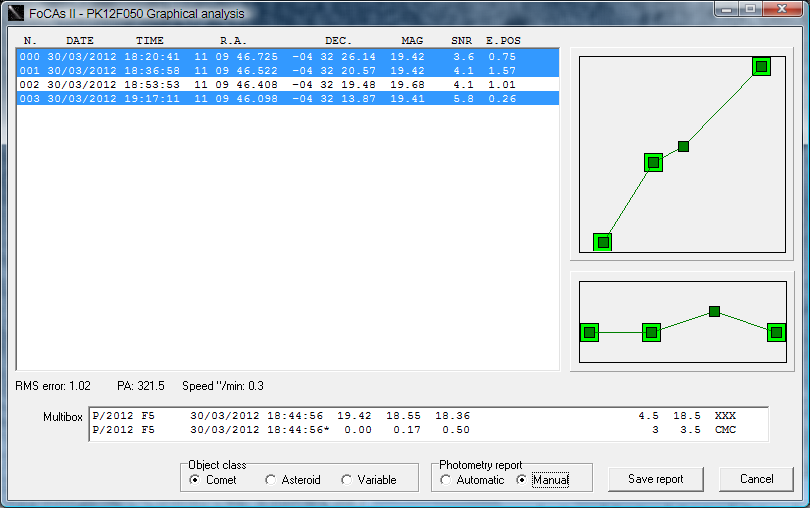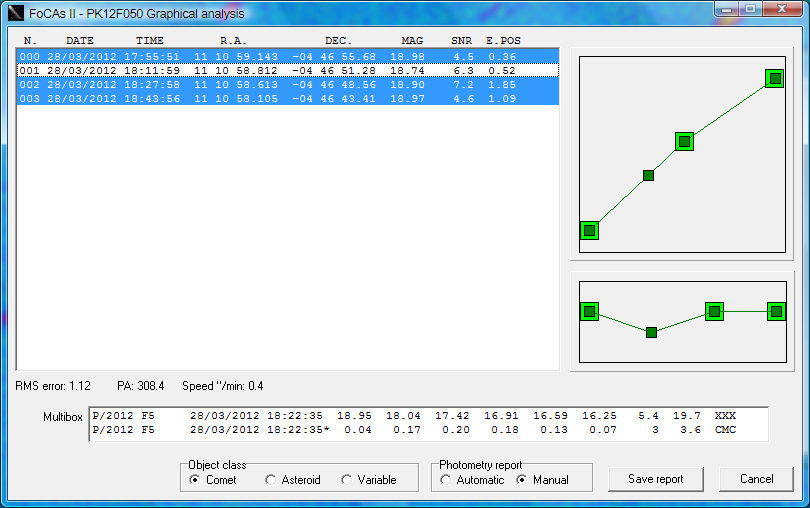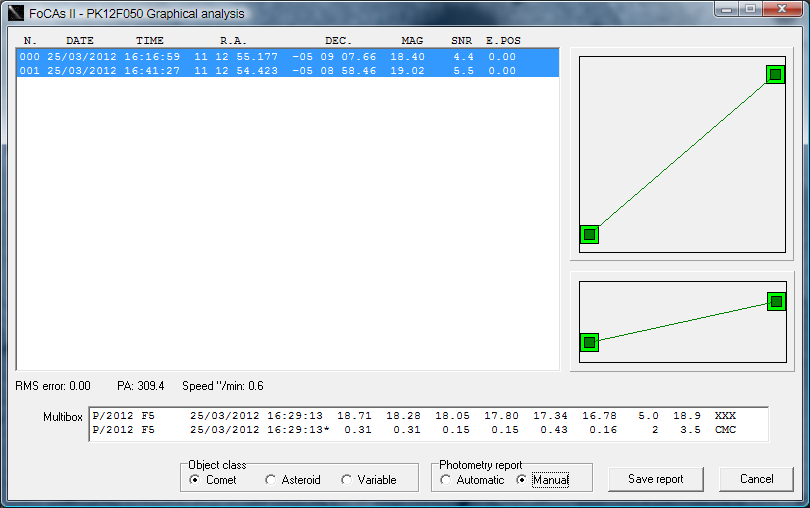Comet
P/2012 F5 (Gibbs)
2012/03/25 2012/03/28
2012/03/30
2012 Mar 30
|
Mouseover to
browse the version in 4-color sequels so long as the extension
of the tail may be
thought to appear more obvious in that version.
|
MPC observation computed with Astrometrica
using both UCAC-3 and CMC-14 star catalogs -- the former for astrometric
reduction and the latter for photometric work:
- COD C42
CON M.-T. Hui, Dept. of Physics, Wuhan University, China
OBS M.-T. Hui, X.Gao
MEA M.-T. Hui
TEL 0.36-m f/6.9 Schmidt-Cassegrain + CCD
NET UCAC-3
PK12F050 KC2012 03 30.76436 11 09 46.72 -04 32 26.1
19.4 N C42
PK12F050 KC2012 03 30.77567 11 09 46.52 -04 32 20.6
19.4 N C42
PK12F050 KC2012 03 30.78742 11 09 46.41 -04 32 19.5
C42
PK12F050 KC2012 03 30.80360 11 09 46.10 -04 32 13.9
19.4 N C42
----- end -----Photometry result computed with FOCAS II,
which processes images based upon the .LOG file of Astrometrica, by means of
Multibox method. The errors deteriorate backward in that the weather was
incooperative and strong moonlight interference.
- COD C42
CATALOG: USNO A2.0 / CMC-14 - BAND: R
10x10 20x20 30x30
40x40 50x50 60x60
SNR SB
COD
OBJECT DATE
TIME +/- +/-
+/- +/- +/- +/-
N FWHM CAT
------------ ---------- -------- -----
----- ----- -----
----- ----- ----
---- ---
P/2012 F5 30/03/2012 18:44:56 19.42 18.55 18.36
4.5 18.5 C42
P/2012 F5 30/03/2012 18:44:56* 0.00
0.17 0.50
3 3.5 CMC
FoCAs II - 17/03/2010
www.astrosurf.com/cometas-obs
es.groups.yahoo.com/group/Cometas_Obs
- Interpretation of the FOCAS II table
headings:
-
-
- Fisrt line:
-
- OBJECT,
DATE, TIME: refering to their original meanings respectively
-
- 10x10,
20x20 ... 60x60: the aperture sizes of photometry in term of
rectangle in arcsec that are used to measure an object's magnitude
-
- SNR:
the Signal-to-Noise Ratio for aperture photometry
-
- SB:
stars of faintest magnitude on the images used in data reduction with
the used star catalog in Astrometrica, rather than the stars of faintest
magnitude in the images
-
- COD:
MPC Code of the observatory
-
-
-
- Second line:
-
- +/-:
precisions of measurement
-
- N:
the number of used images for measurement
-
- FWHM:
Full-Width-Half-Maximum of total PSF, relevant to degree of seeing
-
- CAT:
the used star catalog in Astrometrica
-
-

The measurement was no easy task to acquire
astrometry and photometry in good precision with further negative interference
from the strong moonlight. Consequently, the tail appears to be curtailed to a
great extent. Basically speaking, however, there is no evidence to render that
the global morphology has changed anything different from that during previous
sessions. Our monitor will be taken continuously, conditions permitting.
Copyright @ Man-To
Hui 2012/04/04
2012 Mar 28
|
Mouseover to
browse the version in 4-color sequels so long as the extension
of the tail may be
thought to appear more obvious in that version.
|
MPC observation computed with Astrometrica
using both UCAC-3 and CMC-14 star catalogs -- the former for astrometric
reduction and the latter for photometric work:
- COD C42
CON M.-T. Hui, Dept. of Physics, Wuhan University, China
OBS M.-T. Hui, X.Gao
MEA M.-T. Hui
TEL 0.36-m f/6.9 Schmidt-Cassegrain + CCD
NET UCAC-3
PK12F050 KC2012 03 28.74712 11 10 59.14 -04 46 55.7
19.0 N C42
PK12F050 KC2012 03 28.75832 11 10 58.81 -04 46 51.3
C42
PK12F050 KC2012 03 28.76942 11 10 58.61 -04 46 48.6
18.9 N C42
PK12F050 KC2012 03 28.78051 11 10 58.10 -04 46 43.4
19.0 N C42
----- end -----Photometry result computed with FOCAS II,
which processes images based upon the .LOG file of Astrometrica, by means of
Multibox method. The errors are slightly better than that of the last
observation of the comet.
- COD C42
CATALOG: USNO A2.0 / CMC-14 - BAND: R
10x10 20x20 30x30
40x40 50x50 60x60
SNR SB
COD
OBJECT DATE
TIME +/- +/-
+/- +/- +/- +/-
N FWHM CAT
------------ ---------- -------- -----
----- ----- -----
----- ----- ----
---- ---
P/2012 F5 28/03/2012 18:22:35 18.95 18.04 17.42 16.91 16.59 16.25
5.4 19.7 C42
P/2012 F5 28/03/2012 18:22:35* 0.04
0.17 0.20 0.18
0.13 0.07
3 3.6 CMC
FoCAs II - 17/03/2010
www.astrosurf.com/cometas-obs
es.groups.yahoo.com/group/Cometas_Obs
- Interpretation of the FOCAS II table
headings:
-
-
- Fisrt line:
-
- OBJECT,
DATE, TIME: refering to their original meanings respectively
-
- 10x10,
20x20 ... 60x60: the aperture sizes of photometry in term of
rectangle in arcsec that are used to measure an object's magnitude
-
- SNR:
the Signal-to-Noise Ratio for aperture photometry
-
- SB:
stars of faintest magnitude on the images used in data reduction with
the used star catalog in Astrometrica, rather than the stars of faintest
magnitude in the images
-
- COD:
MPC Code of the observatory
-
-
-
- Second line:
-
- +/-:
precisions of measurement
-
- N:
the number of used images for measurement
-
- FWHM:
Full-Width-Half-Maximum of total PSF, relevant to degree of seeing
-
- CAT:
the used star catalog in Astrometrica
-
-

During the session, the mirror suffered from
increasing coverage of frost in that the humidity was abnormally high, whereby
worsening the quality of the majority of the images. Hence, frankly speaking,
the errors in the photometry are yet large, which could have been much better
were the air dry. As a matter of fact, more than half of the narrow tail towards
its termination is seriously contaminated by the darkened region due to the
frost, which I managed to eliminate by means of manual gradient flatten. With
removal of negative factors, the stacked image well presents the tail, much
longer in measurement of this session. Unfortunately the central condensation is
difficult to locate, hindering astrometric measurement in good precision. The
comet will be kept in monitor.
Copyright @ Man-To
Hui 2012/03/29
2012 Mar 25
|
The mid-term
of the session has witnessed deterioration of the weather. The tail
could have been apparently longer. |
MPC observation computed with Astrometrica
using both UCAC-3 and CMC-14 star catalogs -- the former for astrometric
reduction and the latter for photometric work:
- COD C42
CON M.-T. Hui, Dept. of Physics, Wuhan University, China
OBS M.-T. Hui, X.Gao
MEA M.-T. Hui
TEL 0.36-m f/6.9 Schmidt-Cassegrain + CCD
NET UCAC-3
PK12F050 KC2012 03 25.67846 11 12 55.18 -05 09 07.7
18.4 N C42
PK12F050 KC2012 03 25.69545 11 12 54.42 -05 08 58.5
19.0 N C42
----- end -----Photometry result computed with FOCAS II,
which processes images based upon the .LOG file of Astrometrica, by means of
Multibox method. The errors are somewhat outrageous because of the poor
observation.
- COD C42
CATALOG: USNO A2.0 / CMC-14 - BAND: R
10x10 20x20 30x30
40x40 50x50 60x60
SNR SB
COD
OBJECT DATE
TIME +/- +/-
+/- +/- +/- +/-
N FWHM CAT
------------ ---------- -------- -----
----- ----- -----
----- ----- ----
---- ---
P/2012 F5 25/03/2012 16:29:13 18.71 18.28 18.05 17.80 17.34 16.78
5.0 18.9 C42
P/2012 F5 25/03/2012 16:29:13* 0.31
0.31 0.15
0.15 0.43
0.16 2
3.5 CMC
FoCAs II - 17/03/2010
www.astrosurf.com/cometas-obs
es.groups.yahoo.com/group/Cometas_Obs
- Interpretation of the FOCAS II table
headings:
-
-
- Fisrt line:
-
- OBJECT,
DATE, TIME: refering to their original meanings respectively
-
- 10x10,
20x20 ... 60x60: the aperture sizes of photometry in term of
rectangle in arcsec that are used to measure an object's magnitude
-
- SNR:
the Signal-to-Noise Ratio for aperture photometry
-
- SB:
stars of faintest magnitude on the images used in data reduction with
the used star catalog in Astrometrica, rather than the stars of faintest
magnitude in the images
-
- COD:
MPC Code of the observatory
-
-
-
- Second line:
-
- +/-:
precisions of measurement
-
- N:
the number of used images for measurement
-
- FWHM:
Full-Width-Half-Maximum of total PSF, relevant to degree of seeing
-
- CAT:
the used star catalog in Astrometrica
-
-

The weather has prevented me from acquiring a
better observation of the comet. What accuracy the measurements achieved cannot
be answered definitely. In fact the first twenty images of the sequence were
used to stack with registration to the motion of the comet, which weakly
presents some vague hint of the coma. The last ten are evidently much better, as
the stacked image clearly shows the comet with a long narrow tail.
As extending arcs have been received,
MPEC 2012-F91
published an updated orbit of the comet, which may well indicate a
Main-Belt-Comet. It is worthwhile to await more information to come.
Copyright @ Man-To
Hui 2012/03/27
Feel free to e-mail
me with any doubts or questions.
Top
Back...
-- Zurück...
Home


